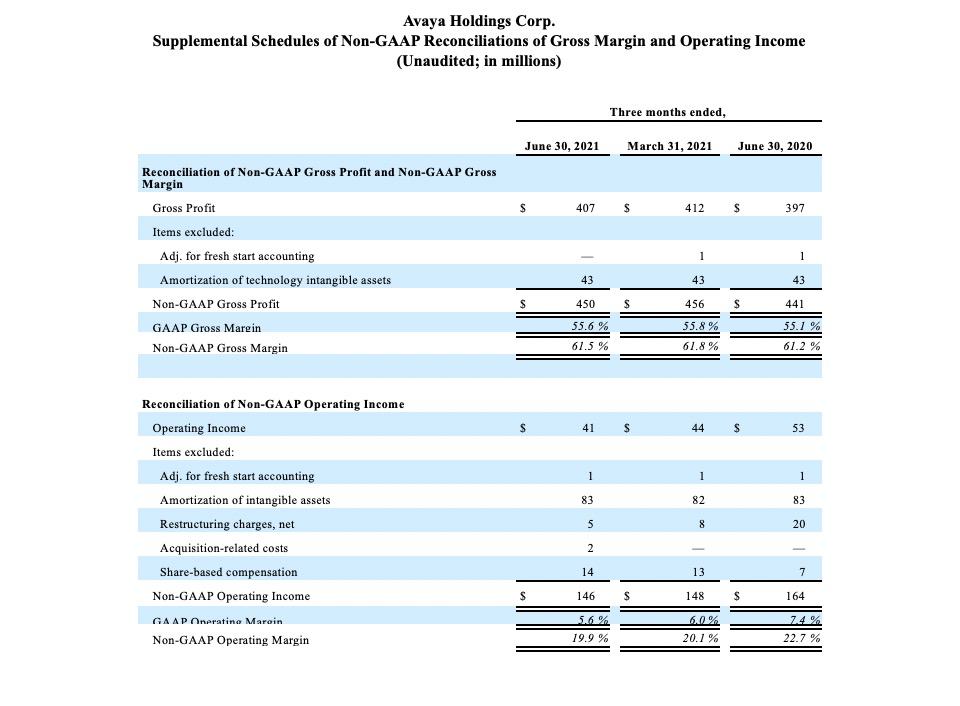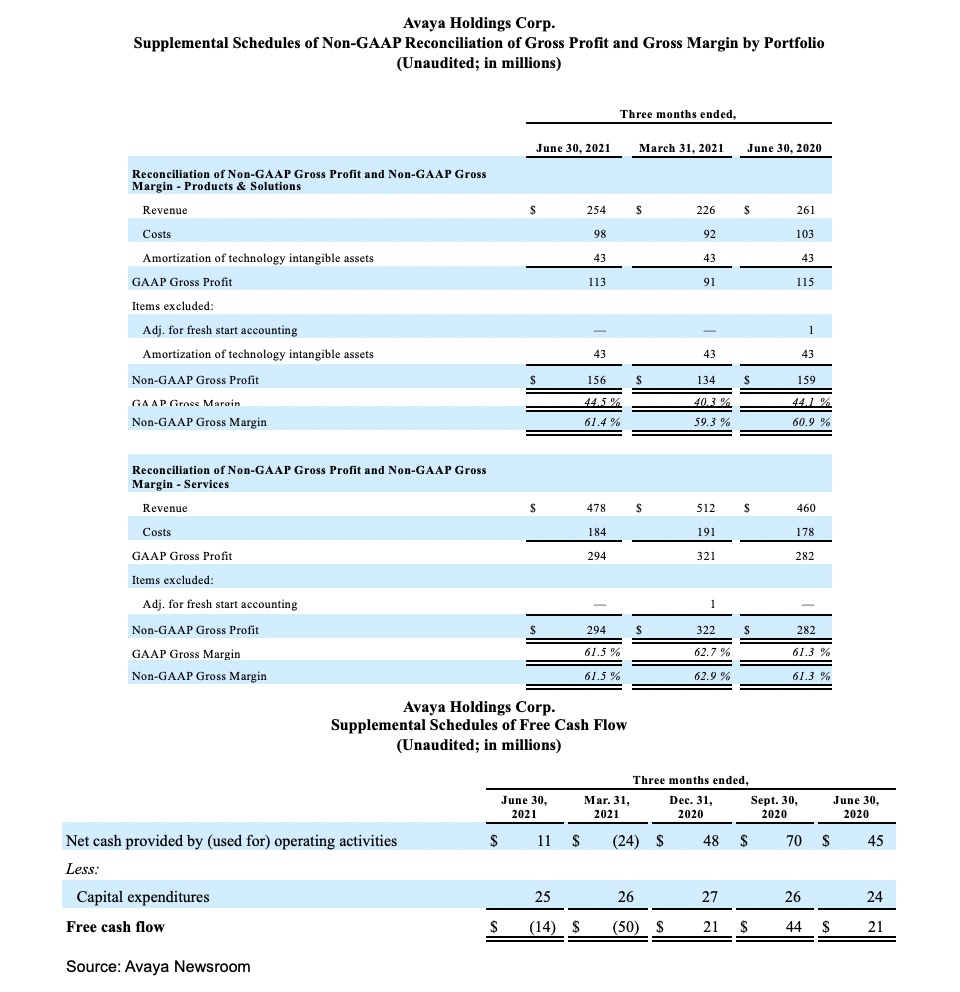- Total revenue increased 2% year-over-year to $732 million
- Avaya OneCloud™ ARR increased over 275% year over year to $425 million
- Raising ARR guidance and expects ARR to reach $1 billion by end of 2022
Raleigh-Durham, NC, - August 9, 2021 - Avaya Holdings Corp. (NYSE: AVYA) today reported financial results for the third quarter of fiscal 2021 ended June 30, 2021.
Third Quarter Financial Highlights
- Revenues of $732 million, up 2% from a year ago
- OneCloud ARR was $425 million, up 23% sequentially
- CAPS (Cloud, Alliance Partner and Subscription) was 40% of revenue, up from 30% a year ago
- Software and services were 88% of revenue, down from 89% a year ago
- Recurring revenue was 64%, flat to 64% a year ago
- GAAP Operating income was $41 million; Non-GAAP Operating income was $146 million
- GAAP Net income was $43 million; Non-GAAP Net income was $73 million
- Adjusted EBITDA was $173 million, 23.6% of revenue, down 230 basis points year over year
- Ending cash and cash equivalents were $562 million
- GAAP Earnings Per Share of $0.43; Non-GAAP Earnings Per Share of $0.75
“Our third quarter represents the fifth consecutive quarter of year over year revenue growth and speaks volumes to the significant progress we’ve made on our transformational strategy. We are executing ahead of plan and I could not be prouder of the Avaya team,” said Jim Chirico, president and CEO of Avaya. “Annual recurring revenue, a key indicator of our progress, is outperforming our expectations, up over 275% percent from a year ago to $425 million, 64% of which is from deals greater than $1 million, consistent with our strong traction in large enterprises. Given this performance, we are again raising our ARR guidance and now expect to cross the $1 billion mark by the end of calendar 2022, about a year ahead of schedule.”
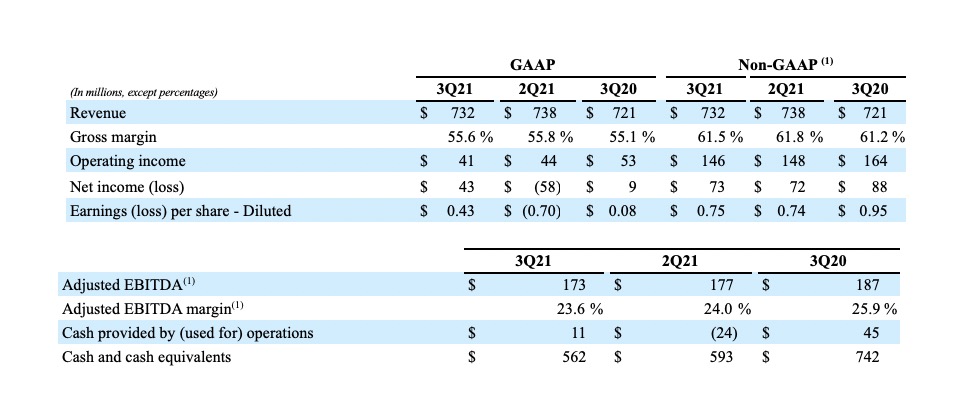
Additional Third Quarter Fiscal 2021 Highlights
- Total Contract Value (TCV) of $2.1B*
- Added approximately 1,700 new logos
- Significant large deal activity with 100 deals over $1 million TCV, 19 over $5 million and 3 over $10 million
- ~60% of OneCloud ARR came from customers generating $1 million or more in annual recurring revenue
- ~95% of OneCloud ARR came from customers generating $100K or more in annual recurring revenue
- ~60% of OneCloud ARR came from Contact Center customers
(1) Non-GAAP gross margin, Non-GAAP operating margin (used below), Non-GAAP operating income, Non-GAAP net income, Non-GAAP earnings per share, adjusted EBITDA, adjusted EBITDA margin and constant currency are not measures calculated in accordance with generally accepted accounting principles in the U.S. (“GAAP”). Refer to the "Use of non-GAAP (Adjusted) Financial Measures" below and the Supplemental Financial Information accompanying this press release for more information on the calculation of constant currency and a reconciliation of these non-GAAP measures to the most closely comparable measure calculated in accordance with GAAP.
* We define TCV as the value of all active ratable contracts that have not been recognized as revenue, including both billed and unbilled backlog.
Customer Highlights
- 9mobile, one of the largest telecoms operators in Nigeria, has moved 1,500 users to Avaya OneCloud Subscription as the first step in delivering a flexible, multichannel contact center experience to customers.
- Agnes Scott College selected Avaya Cloud Office for its more than 1,000 users, citing affordability, a more modern experience, and compliance as key decision factors.
- The Atlanta Group, part of the worldwide Ardonagh Group and one of the largest and fastest-growing brokers in the UK insurance market, is using Avaya OneCloud CCaaS to deliver a single-agent experience, regardless of location. Avaya expanded its footprint across the business, displacing competitive systems previously used within the specific brands of their portfolio.
- A customer in South America who runs a very large family compensation fund with more than 3.4 million users, signed an Avaya OneCloud Subscription contract to provide a total experience transformation for service users, including UC, multi-experience Contact Center applications, and video across social media and traditional channels.
- Avaya Cloud Office was selected by Empire State Realty Trust for over 500 users across their 14 retail and office locations. In a competitive deal, Empire State Realty Trust said that the flexibility, scalability and cost savings Avaya Cloud Office brings were the key reasons behind their decision.
- General Atomics, one of the largest defense contractors in the United States, has chosen Avaya OneCloud Private to address their needs for a secure UC cloud solution. The solution will maintain compliance with Federal Information Processing Standards and a secure remote working environment for 18,000 users across more than 25 sites. In a competitive situation, General Atomics put their trust in Avaya to deliver, manage, and ensure the long-term needs of their workforce and the Country are being met.
- Nicholls State University signed a five-year deal to deploy Avaya Cloud Office for over 1,100 users across its Thibodaux, Louisiana campus. Nicholls State selected Avaya Cloud Office for flexibility to meet the communications demand of their students in an efficient manner, whether the users are on campus or off.
- Yellow, formerly YRC - the national trucking, shipping, and logistics company and a long-time Avaya customer, signed a deal to for 12,000 Avaya Cloud Office licenses. They were seeking a cloud-based UC solution for their mobile workforce. Requirements centered around ease of deployment and scalability and Avaya delivered.
- Australia Gas and Light moved into an Avaya OneCloud Private to support the 1500+ agents across multiple locations. Avaya’s long-time partnership and ability to deliver innovation and value positioned it over 9 competitors (including: Microsoft, Genesys, Amazon, Cisco and 8x8). The solution sets this customer up for success and growth in their 3-year plan that includes the consideration of a move to a full CCaaS cloud solution in the future.
Business Highlights
- Avaya was identified as a Leader in The Aragon Research Globe for Video Conferencing 2021.
- Avaya has been designated an Innovative Vendor and a Value Index Leader in the Capability category, and ranked among the top five CCaaS providers overall in the Ventana Research ‘2021 Value Index for Contact Center in the Cloud.’
- Avaya was named a Leader in The Aragon Research Globe for Unified Communications and Collaboration (UC&C) 2021. The evaluation was based on completeness of strategy and performance.
- Avaya was named a “Major Player” in the 2021 IDC MarketScape for the worldwide CPaaS (Communications Platform as a Service) market. Avaya OneCloud™ CPaaS enables organizations to create and deliver more memorable experiences by assembling and combining business capabilities to achieve the outcomes they need, in the moment, for their customers and their teams.
Financial Outlook - 4Q Fiscal 2021 - unless otherwise noted, values reflect July 31, 2021 FX rates.
- Revenue of $720 million to $750 million
- GAAP operating income of $14 million to $29 million; GAAP operating margin of 2% to 4%
- Non-GAAP operating income of $131 million to $146 million; non-GAAP operating margin of 18% to 19%
- Adjusted EBITDA of $160 million to $175 million; Adjusted EBITDA margin of 22% to 23%
- Non-GAAP EPS of $0.66 to $0.78
Financial Outlook - Fiscal Year 2021 - unless otherwise noted, values reflect July 31, 2021 FX rates.
- Revenue of $2.930 billion to $2.960 billion
- CAPS revenue will represent between 39% and 40% of Avaya's total revenue guidance for FY21
- OneCloud ARR expected to be ~$490 million to $500 million by year end FY21
- GAAP operating income of $161 million to $176 million; GAAP operating margin of ~6%
- Non-GAAP operating income of $588 million to $603 million; non-GAAP operating margin of ~20%
- Adjusted EBITDA of $700 million to $715 million; Adjusted EBITDA margin of ~24%
- Non-GAAP EPS of $3.05 to $3.16
- Cash flow from operations has been revised to approximately 1% of revenue, as an outcome of the company’s accelerated success in moving to a recurring revenue model which is resulting in higher working capital requirements
- Approximately 87 million to 88 million weighted average shares outstanding
The company has not quantitatively reconciled its guidance for adjusted EBITDA, non-GAAP Operating income, or non-GAAP EPS to their respective most comparable GAAP measure because certain of the reconciling items that impact these metrics including, provision for income taxes, restructuring charges, net of sublease income, advisory fees, acquisition-related costs and change in fair value of warrants affecting the period, have not occurred, are out of the company’s control, or cannot be reasonably predicted. Accordingly, reconciliations to the nearest GAAP financial measures are not available without unreasonable effort. Please note that the unavailable reconciling items could significantly impact the company’s results as reported under GAAP.
As Avaya’s CAPS metric reflects revenue that is already recognized, management believes it would be helpful to provide investors with a better view into the performance of the company’s broader-based OneCloud software solutions that are driving the company’s recurring revenue growth by also providing a forward-looking metric, Annualized Recurring Revenue, or OneCloud ARR.
OneCloud ARR represents our estimate of the annualized revenue run-rate of certain components from active term OneCloud contracts (whether or not terminable) at the end of the reporting period. More specifically, OneCloud ARR includes OneCloud subscription revenue, ACO recurring revenue and revenue from CCaaS, Spaces, CPaaS, DaaS and private cloud, and excludes maintenance, managed services revenue and ACO one-time payments. The One Cloud ARR metric, combined with the company’s CAPS metric, provides investors enhanced visibility into Avaya’s transformational Cloud journey. Per period OneCloud ARR figures are provided in the slides published on Avaya’s website at http://www.avaya.com on the Investor Relations page.
Avaya’s outlook does not include the potential impact of any business combinations, asset acquisitions, divestitures, strategic investments, or other significant transactions that may be completed after the date hereof. Actual results may differ materially from Avaya’s outlook as a result of, among other things, the factors described under “Forward-Looking Statements” below.
Conference Call and Webcast
Avaya will host a live webcast and conference call to discuss its financial results at 8:30 AM Eastern Time on August 9, 2021. To access the live conference call by phone, listeners should dial +1-877-858-7671 in the U.S. or Canada and +1-201-389-0939 for international callers. To join the live webcast, listeners should access the investor page of Avaya's website at https://investors.avaya.com.
Following the live webcast, a replay will be available on the investor page of Avaya's website for a period of one year. A replay of the conference call will be available for one week soon after the call by phone by dialing +1-877-660-6853 in the U.S. or Canada and +1-201-612-7415 for international callers, using the conference access code: 13717569.
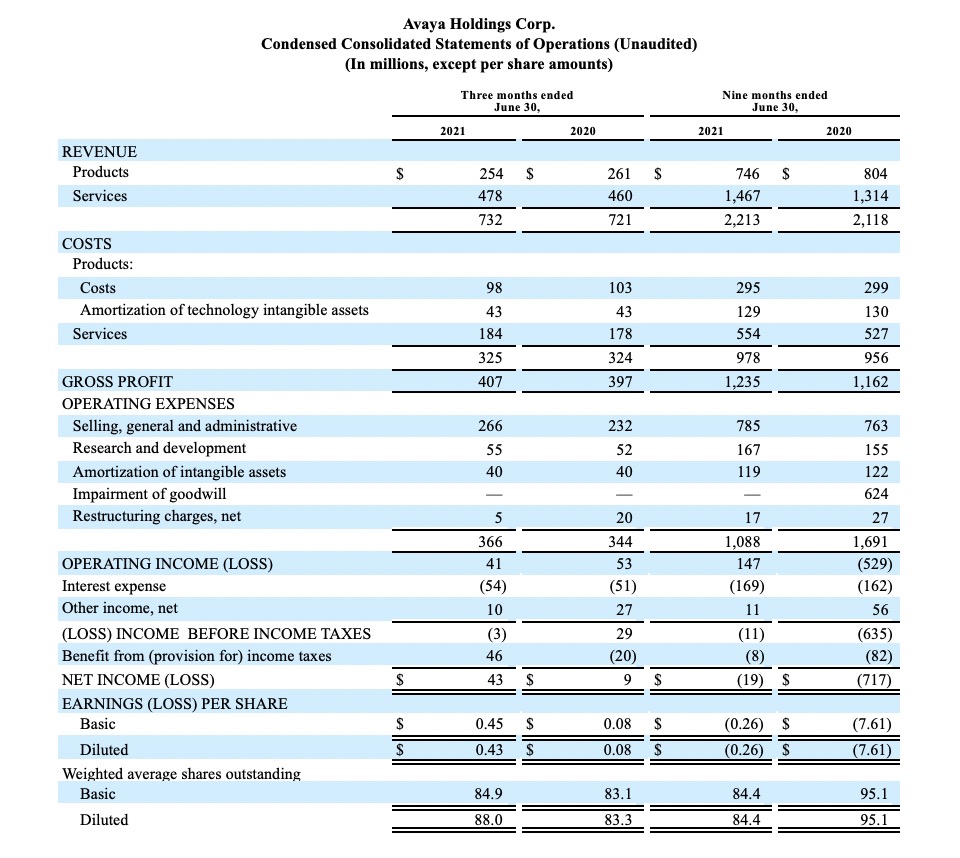
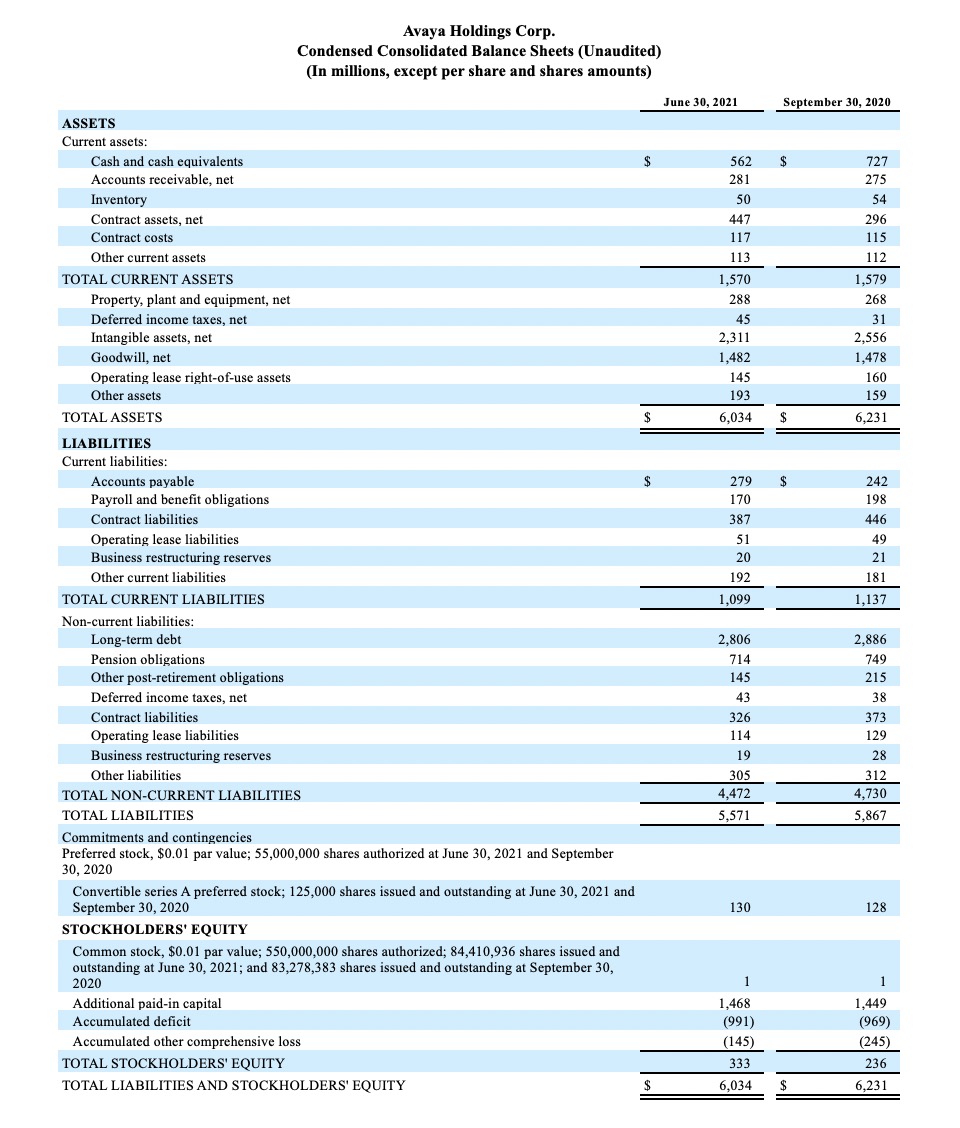
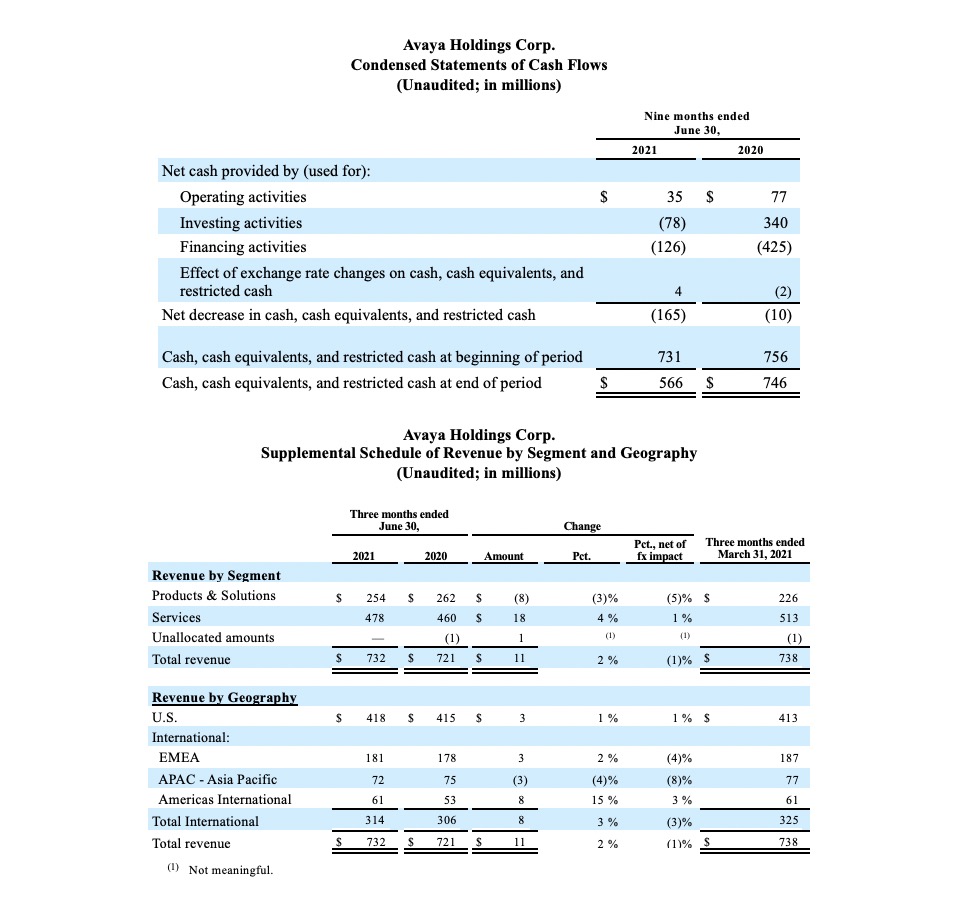
Use of non-GAAP (Adjusted) Financial Measures
The information furnished in this release includes non-GAAP financial measures that differ from measures calculated in accordance with generally accepted accounting principles in the United States of America (“GAAP”), including financial measures labeled as “non-GAAP” or “adjusted.”
EBITDA is defined as net income (loss) before income taxes, interest expense, interest income and depreciation and amortization. Adjusted EBITDA is EBITDA further adjusted to exclude certain charges and other adjustments described in our SEC filings and the tables below.
We believe that including supplementary information concerning adjusted EBITDA is appropriate because it serves as a basis for determining management and employee compensation and it is used as a basis for calculating covenants in our credit agreements. In addition, we believe adjusted EBITDA provides more comparability between our historical results and results that reflect purchase accounting and our current capital structure. We also present adjusted EBITDA because we believe analysts and investors utilize these measures in analyzing our results. Adjusted EBITDA measures our financial performance based on operational factors that management can impact in the short-term, such as our pricing strategies, volume, costs and expenses of the organization, and it presents our financial performance in a way that can be more easily compared to prior quarters or fiscal years.
EBITDA and adjusted EBITDA have limitations as analytical tools. EBITDA measures do not represent net income (loss) or cash flow from operations as those terms are defined by GAAP and do not necessarily indicate whether cash flows will be sufficient to fund cash needs. Adjusted EBITDA excludes the impact of earnings or charges resulting from matters that we do not consider indicative of our ongoing operations but that still affect our net income. In particular, our formulation of adjusted EBITDA allows adjustment for certain amounts that are included in calculating net income (loss), however, these are expenses that may recur, may vary and are difficult to predict. In addition, these terms are not necessarily comparable to other similarly titled captions of other companies due to the potential inconsistencies in the method of calculation.
We also present the measures non-GAAP gross margin, non-GAAP operating income, non-GAAP operating margin, non-GAAP net income and non-GAAP earnings per share as a supplement to our unaudited condensed consolidated financial statements presented in accordance with GAAP. We believe these non-GAAP measures are the most meaningful for period to period comparisons because they exclude the impact of the earnings and charges noted in the applicable tables below that resulted from matters that we consider not to be indicative of our ongoing operations.
The company presents constant currency information to provide a framework to assess how the company’s underlying businesses performance excluding the effect of foreign currency rate fluctuations. To present this information for current and comparative prior period results for entities reporting in currencies other than U.S. dollars, the amounts are converted into U.S. dollars at the exchange rate in effect on the last day of the company’s prior fiscal year (i.e. September 30, 2020).
In addition, we present the liquidity measures of free cash flow. Free cash flow is calculated by subtracting capital expenditures from Net cash provided by operating activities. We believe free cash flow is a measure often used by analysts and investors to compare the cash flow and liquidity of companies in the same industry.
The presentation of these non-GAAP financial measures is not intended to be considered in isolation from, as substitute for, or superior to, the financial information prepared and presented in accordance with GAAP and may be different from the non-GAAP financial measures used by other companies. In addition, these non-GAAP measures have limitations in that they do not reflect all of the amounts associated with the Company’s results of operations as determined in accordance with GAAP.
We do not provide a forward-looking reconciliation of expected third quarter and full year fiscal 2021 non-GAAP gross margin, non-GAAP operating expenses, non-GAAP operating income, non-GAAP operating margin, non-GAAP earnings per share or adjusted EBITDA guidance as the amount and significance of special items required to develop meaningful comparable GAAP financial measures cannot be estimated at this time without unreasonable efforts. These special items could be meaningful.
The following tables reconcile historical GAAP measures to non-GAAP measures.
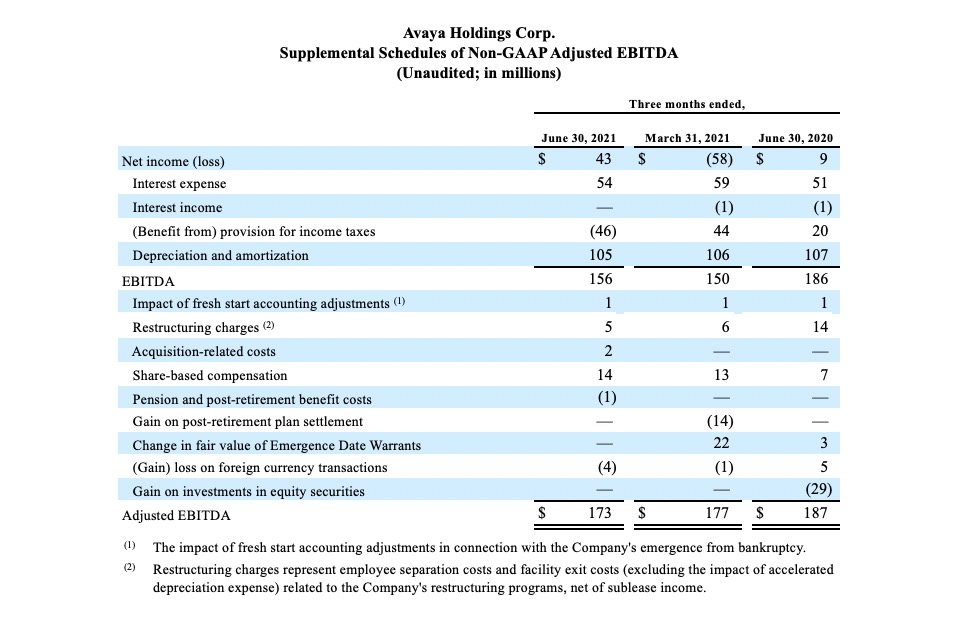
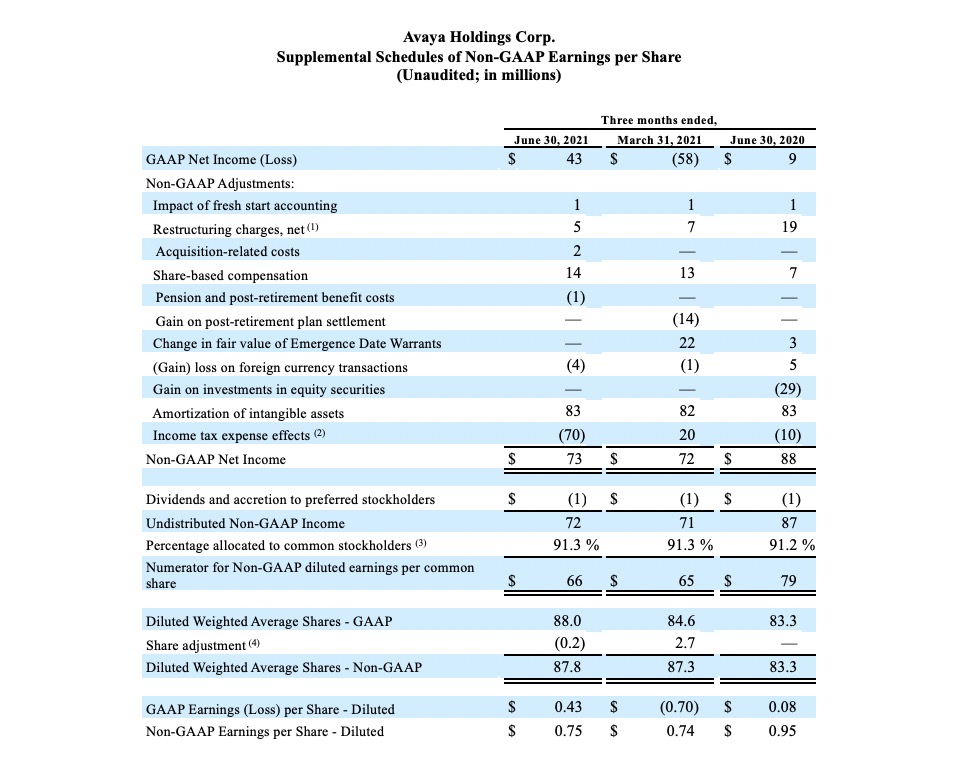
(1) Restructuring charges, net represent employee separation costs and facility exit costs related to the Company's restructuring programs, net of sublease income.
(2) The Company’s calculation of non-GAAP income taxes reflects a 25% fixed non-GAAP effective tax rate based on a blended U.S. federal and state tax rate, given the Company’s operating structure. The non-GAAP effective tax rate may differ significantly from the GAAP effective tax rate. The non-GAAP effective tax rate could be subject to change for a number of reasons, including but not limited to, changes resulting from tax legislation, material changes in revenues or expenses and other significant events. The Company will continuously assess its estimated non-GAAP effective tax rate in connection with its calculation of non-GAAP net income and non-GAAP net income per diluted share in future periods.
(3) The Company’s preferred shares are participating securities, which requires the application of the two-class method to calculate diluted earnings per share. Under the two-class method, undistributed earnings are allocated to common stock and participating securities according to their respective participating rights in undistributed earnings. The percentage allocated to common stockholders reflects the proportion of weighted average common stock outstanding to the weighted average of common stock and common stock equivalents (preferred shares).
(4) Includes the impact of our bond hedge transaction which is anti-dilutive in diluted GAAP earnings (loss) per share but is expected to mitigate the dilutive effect of our convertible notes and therefore are included in the calculations of non-GAAP diluted shares outstanding. In periods with a GAAP net loss, the share adjustment also reflects the dilutive impact of certain securities, which are excluded from the computation of diluted GAAP loss per share as they are anti-dilutive.
